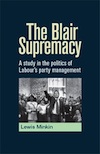BARRY WINTER considers the culture, impact and legacy of Tony Blair’s leadership of the Labour Party, greatly aided by Lewis Minkin’s The Blair Supremacy, published to great acclaim two years ago.
In his dual role as academic and political insider, Lewis Minkin has produced three monumental books on the Labour Party. Each is a substantial achievement. Taken together, I’d argue, they have no equal.
In fact, given their detail, depth… and weight, I prefer to see them as three bibles.
 His first volume was on the Labour Party’s annual conference. Published in 1978, it was eight years in the making. Then in 1991 came The Contentious Alliance on the party’s relationship with the unions, and now we have this latest work.
His first volume was on the Labour Party’s annual conference. Published in 1978, it was eight years in the making. Then in 1991 came The Contentious Alliance on the party’s relationship with the unions, and now we have this latest work.
For me, the study of Labour Party conference served as a very practical bible. It provided a rich account of how the party’s annual conference had been managed. As a party and trade union activist, it gave me insights into how these processes might be challenged. Indeed, the ILP published a thin, cheap and cheerful version to support the calls for greater party democracy.
On a few occasions, I had the privilege of being with Lewis at conference during this time. I recall how, seated in the balcony, he would very carefully watch the trade union delegations below to see who was conferring with whom as an important vote approached. He taught me to use my eyes as well as my ears politically.
This latest work, The Blair Supremacy, also offers profound insights, this time into the dominance – and its effects – of what some call the ‘Blairocracy’. During the Blair years, many of us struggled to understand the nature of the beast. Thanks to Lewis, we can now see in detail what took place: namely, how a small coterie successfully subordinated and, as Lewis puts it, “managerialised” the party.
What gave them the confidence to act to in this way?
To the promised land
Tony Blair certainly liked to portray himself as the harbinger of the future, as the person who could best lead Labour into the promised land, that he and his team were gifted with special insights as well as the ability to connect with wider society.
He and his entourage took a negative, indeed dismissive, view of the party itself. They were eager to stride over what they saw as the decaying corpse of ‘Old Labour’ and to march us, with heads held high, into their brave New Labour world.
The sooner Labour’s fuddy-duddy, old-fashioned procedures were swept away the better. This meant updating, remaking and reshaping the party at every level: from the Clause 4 rewrite to the conduct and style of party conferences; from downplaying the links with the trade unions to side-lining the national executive; and much, much more. Party officials became Blair’s disciples rather than the party’s employees. Their job was to deliver whatever he decreed.
Lewis argues that the result was, quite simply, a “leader-centred party.”
Blair’s politics can be seen a crusade. And, as an ardent crusader, he believed he had right on his side, even if this meant being ruthless. This reminds me of those vanguardists of the far left who always know what’s best for us, if only we’d listen (or at least buy their paper).
Even the former party leader, the adroit John Smith, was seen by the Blairites as 25 years out of date. Party activists were deemed irrational, the unions curmudgeonly. Blair’s small vanguard therefore had a duty to put this all right and they set about doing so with gusto: ‘Onward Christian soldiers marching as to war’.
Super-confidence
But alas, such super-confidence can quickly disfigure politics. Blair certainly could move an audience. He could convince people that he understood them and was on their side. He could be charming and persuasive. But beneath all that charisma was a vision of a party required to do his bidding: a New Labour PLC to match a new Britain PLC.
So what was the basis of the Blair vision? As he told delegates to the Socialist International shortly after Labour’s – or should I dutifully say his – election victory in 1997, “New, new, everything is new.”
The result was, as Lewis puts it, “a covert rolling coup imposing or manipulating change without party agreement”.
The party and society were both to be governed by the simple but the oft-repeated mantra: “what matters is what works”. The problem is that there are always matters of judgement, not pre-ordained certainties.
Of course, Blair did not always get his way – for example, he failed to achieve his early wish to sever the party’s links with the trade unions. He also failed when he try to woo the business world into a closer relationship, to sit alongside the unions. But he did achieve a substantial transformation of the party, its personnel, practices and policies.
Relevance
Is any of this still relevant today? After all, Tony Blair ceased leading the party and being prime minister almost a decade ago.
I believe it is. The Blair legacy produced a deeply damaged Labour Party which is still in need of repair. During his period as prime minister 50,000 seriously disillusioned members left the party. For those who remained, this made the job of wining support on the doorstep even tougher. More than that, Labour lost the trust of many of its traditional supporters and added to the growing cynicism about politics and politicians.
Blair might not think so, but politics is, of necessity, a messy and untidy business, sometimes fluid and uncertain, often confusing and contradictory. But it can also be creative. To be so, it needs to be collaborative, a mutual learning process. Devaluing that understanding did immeasurable harm to the bonds that bring people together into the party, whatever their differences.
Since its foundation the Labour Party has been a complex institution. Yet at its best, it did have aspects that were worth encouraging rather than denigrating. Dialogues and indeed disagreements are vital. What matters is how they are conducted. We also need fellowship and a degree of mutual respect. This is because we all have much to learn and, sometimes, to unlearn.
Neoliberalism
How are we to understand the Blair phenomenon politically? Here, I’d suggest Margaret Thatcher had it about right. When asked what her greatest achievement was, she succinctly replied, “New Labour”.
Blair’s third way was really a version of the neoliberalism initiated by Thatcher and Sir Keith Joseph. It was a world of deregulated markets, light-touch regulation of business and finance, and privatisation. It shifted the balance of power and wealth towards the wealthy. It gave us a new common sense based on individualism and looking after you and yours. It gave us what some have called a ‘me-first society’.
For brevity, I offer one example.
Polly Toynbee notes that after a decade of Thatcherism, the average chief executive in FTSE 100 companies earned 17 times the wage of an average worker. Two decades later, by the time of Blair’s departure, they earned more than 75 times the wage of an average worker.
To be fair, there were many positive gains introduced by New Labour in power but they tended be brought in by stealth. Along with some useful social reforms, the New Labour government consolidated the grip of neoliberalism on our lives.
Today, with Jeremy Corbyn’s election as leader, the winds of change are again blowing through the Labour Party. Corbyn has been subjected to a torrent of abuse. Many Blairites, not least in the parliamentary party, have been quick to pile on the insults. They are not happy bunnies. They have lost their divine right to rule… and it hurts.
Blair did have the humility to admit that he does not understand what’s been taking place. So to help him, I sent some advice in a letter to The Guardian. They did not print it. But here, by way of a conclusion, is a slightly tweaked version of what I wrote:
“If Tony Blair is genuinely struggling to understand the appeal of Jeremy Corbyn, I have three suggestions.
“First, look carefully into the mirror; next, read The Blair Supremacy by Lewis Minkin; and finally, talk to those who supported Corbyn, not all of whom are young.
“If that’s not enough, consider the widespread alienation felt towards politicians – to which you made a significant contribution. And, if all that fails to help, take up gardening.”
—-
 This is an edited version of a talk given at the Leeds launch of The Blair Supremacy earlier this month.
This is an edited version of a talk given at the Leeds launch of The Blair Supremacy earlier this month.
The Blair Supremacy: A study in the politics of Labour’s party management, by Lewis Minkin, is published by Manchester University Press. Priced £26.99 paperback. Click here for more information or to buy the book.
See also: ‘Blair, Management and Neoliberalism’, by Hugo Radice.
Further contributions from speakers at the event will be published on this website in the next few weeks.



16 March 2016
Perhaps it is not just Blair who has had difficulty understanding the appeal of Corbyn within the Labour Party. Minkin’s book is almost 800 pages long and was published just a year or so before Corbyn became leader. Yet Corbyn does not (according to the index) get a signal mention. Whilst Dennis Skinner has 15 and even I make one.